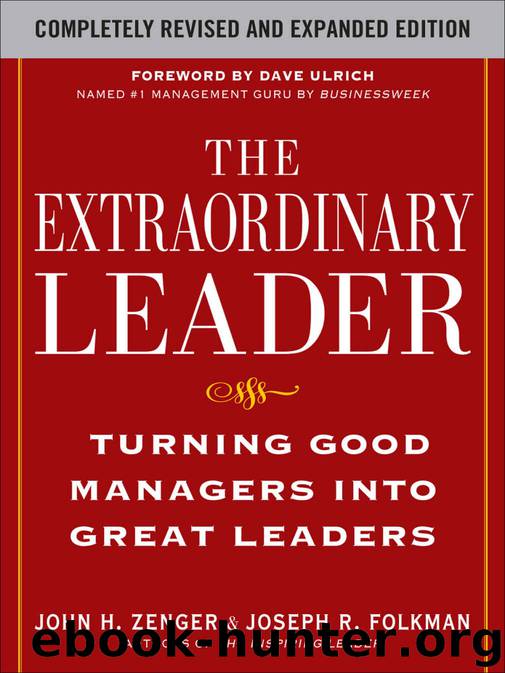The Extraordinary Leader: Turning Good Managers into Great Leaders by Joseph Folkman & John Zenger

Author:Joseph Folkman & John Zenger
Language: eng
Format: mobi
Publisher: McGraw-Hill Education
Published: 2009-05-01T14:00:00+00:00
This formula expands the elements of trust and helps to explain why trust is so easily eroded. Credibility describes the degree to which people believe their leader to be technically competent and to have adequate knowledge about an issue. Reliability describes the consistency and predictability displayed by the leader. Intimacy defines the warmth and closeness of the relationship. (Trust diminishes when subordinates feel an icy, distant aura around the leader.) Finally, the formula suggests that the three main components all get divided by the self-interest displayed by the leader. If decisions are made for personal gain and glory, not the organization’s welfare, then trust plummets.
5. Not a collaborative, team player
Many of the leaders who derailed had a difficult time cooperating with other leaders. They viewed work as a competition and other leaders as opponents. Rather than developing positive relationships with peers, they avoided them and looked for ways to act independently. Their lack of collaboration caused them to be set adrift without the help or insights of others.
Virtually every study that has been conducted on the impact of competition versus collaboration has shown that competition loses. Why? Success in today’s world demands the sharing of information and resources. Competition erodes and finally destroys that. Competition breeds suspicion and hostility that in turn actively discourage any sharing of information and resources. Furthermore, trying to do well for the overall organization and trying to beat an internal competitor are two totally different objectives. Both cannot be met at the same time.2
6. Not a good role model (failure to walk the talk)
A highly predictable path to failure is to behave in ways that are clearly opposite to the values and culture of the organization. Unfortunately, examples of this abound. The leader announces that everyone needs to control expenses and then proceeds to book the most expensive hotels and eat in the highest priced restaurants. Or the leader publicly declares that people are the most valuable asset and deserve to be treated with the greatest respect, and then proceeds to publicly berate a secretary to the point of tears. Beyond that, this is the leader who never thanks people for their contributions and hard work.
As a rule, organizations tend to choose as their leader a person who personifies the values of the organization. The leader of a street gang is chosen for being tough, fearless, and combative. The leaders of religious orders are chosen because they represent the values of the order—selflessness, compassion, service, and introspection. Similarly, we expect the leader of a business or public agency to represent the values it proclaims. When leaders fail to do that, this ultimately leads to their downfall.
7. No self-development and learning from mistakes
There is an extremely interesting body of research on derailed executives. Morgan McCall, Jr., and Michael Lombardo have written extensively regarding executives who were expected to go all the way to the top of their organizations, but who got derailed. These researchers compared those who were derailed with those whose careers took them to senior positions in their firms.
Download
This site does not store any files on its server. We only index and link to content provided by other sites. Please contact the content providers to delete copyright contents if any and email us, we'll remove relevant links or contents immediately.
Hit Refresh by Satya Nadella(9125)
The Compound Effect by Darren Hardy(8944)
Change Your Questions, Change Your Life by Marilee Adams(7759)
Nudge - Improving Decisions about Health, Wealth, and Happiness by Thaler Sunstein(7692)
The Black Swan by Nassim Nicholas Taleb(7107)
Deep Work by Cal Newport(7064)
Rich Dad Poor Dad by Robert T. Kiyosaki(6612)
Daring Greatly by Brene Brown(6502)
Principles: Life and Work by Ray Dalio(6421)
Playing to Win_ How Strategy Really Works by A.G. Lafley & Roger L. Martin(6238)
Man-made Catastrophes and Risk Information Concealment by Dmitry Chernov & Didier Sornette(6005)
Big Magic: Creative Living Beyond Fear by Elizabeth Gilbert(5754)
Digital Minimalism by Cal Newport;(5749)
The Myth of the Strong Leader by Archie Brown(5499)
The Slight Edge by Jeff Olson(5410)
Discipline Equals Freedom by Jocko Willink(5379)
The Motivation Myth by Jeff Haden(5204)
The Laws of Human Nature by Robert Greene(5172)
Stone's Rules by Roger Stone(5081)
